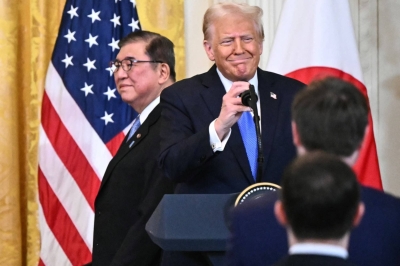The Bledisloe Cup, one of rugby's showcase events, will debut on Japanese soil Saturday at Tokyo's National Stadium.
Contested by Australia and New Zealand since 1931, the Bledisloe Cup is making its second appearance in Asia. The test in Tokyo kicks off an extended tour, which will continue in Europe, where the sides will play Wales, Italy, England, France and the Barbarians between Nov. 7 and Dec. 5.
Ahead of Saturday's showdown, Japan is suiting both teams well.
"We have been welcomed with open arms by the Japanese people," All Blacks head coach Graham Henry said. "The team is certainly enjoying the hospitality and culture here and looking forward to playing in front of the Japanese fans."
Named after its donor, New Zealand Governor General Lord Charles Bathurst Bledisloe, the cup symbolizes a long-standing rivalry between the two Southern Hemisphere rugby powers.
New Zealand has had more success, however, winning the cup, which became part of the Tri Nations Tournament in 1996, 37 times against Australia's 12.
This year, the trend has continued, with three consecutive wins for the All Blacks, the last one a 33-6 demolition of Australia on Sept. 19 in Wellington.
In Tokyo, the All Blacks implement only three changes to their winning team because of injury, with Rodney So'oialo starting at No. 8, Sitiveni Sivivatu at wing and Conrad Smith at center.
"This selection is a pat on the back for what the guys did," Henry said. "It is an acknowledgment of what was achieved in Wellington."
The Wallabies, meanwhile, made four personnel changes to their struggling lineup, with wings Digby Ioane and Peter Hynes, center Ryan Cross and No. 8 Wycliff Palu coming in, while veteran captain flanker George Smith moves to the bench. Inside center and vice-captain Berrick Barnes will miss the game due to an ankle injury sustained in training on Thursday, moving Adam Ashley-Cooper to inside center and James O'Connor at fullback.
Traditionally, the Bledisloe Cup was played on home soil of the Trans-Tasman rivals, but it debuted in Asia on Nov. 1, 2008, with a sellout crowd of 39,000 on hand at Hong Kong Stadium. The All Blacks beat the Wallabies 19-14 in an exciting game that generated record revenues, something the Japanese rugby union hopes to do as well.
A successful game would also please visiting IRB chairman Bernard Lapasset and CEO Mike Miller, in prelude to a two-day marathon briefing between IRB officials and the Japanese union concerning a strategic plan leading up to the 2019 Rugby World Cup, to which Japan won the hosting rights earlier this year.
Other prestigious guests will include New Zealand Prime Minister John Key and Minister of Foreign Affairs and Minister for the Rugby World Cup Murray McCully.
Key, who is in Japan to hold free-trade talks with Prime Minister Yukio Hatoyama, is also promoting the 2011 New Zealand Rugby World Cup in Tokyo.
"Our delegation is here to promote the game for the Asian market." said McCully. "With the 2011 and 2019 World Cups, we can implement a 10-year cooperation strategy between the two countries at every level of the sport."
Part of this promotion is the Giant Rugby Ball Project at Tokyo Tower, a traveling installation of state-of-the-art AV display accompanied by Maori dance shows.
The installation has traveled around the world, from the Eiffel Tower in 2007 to London Tower Bridge in 2008, and now to Tokyo Tower, coinciding with the Bledisloe Cup.


















With your current subscription plan you can comment on stories. However, before writing your first comment, please create a display name in the Profile section of your subscriber account page.